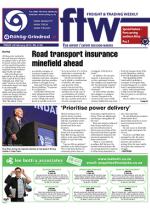All the parties involved in
the road transport of goods
are going to have to get their
insurance houses into order,
or they may find themselves
in contravention of the new
regulations in the National
Road Traffic Act 1996.
And, according to our
legal adviser on the subject,
Peter Lamb of Norton Rose
Fulbright, just what “into
order” means is not too clear,
with certain terms “too vague
to be enforceable”.
Agreeing with this lack of
clarity and enforceability was
Leonie van Rooyen, director
of insurance broker and
intermediary Prestmarine.
“But,” she added, “if you
as a haulier, consignee or
consignor transport more
than 500 tonnes of cargo a
month by road, these amended
regulations (and any penalties
attached) will apply to you.”
And, said Prestmarine MD
Riaan Grobbelar: “In practice
it’s a nightmare.”
Lamb told FTW that the
basic ruling behind all this
reads: “A person operating
a motor vehicle that carries
goods on a public road, must
be in possession of a written
declaration containing the
following information:
“The licence number of
each vehicle or combination
of vehicles; the nature
and quantity of the
goods transported; the
contact particulars of the
operator (or, in the case of
a combination of vehicles,
the operator of each part of
the rig); and the particulars
of every consignor and
consignee of the load or
loads.”
In addition, the operator
must be in possession of a
written agreement between
the consignor and operator for
the “transportation of goods”
– and that vital “schedule of
insurance”.
In terms of this schedule,
the consignee or consignor
“insures” the goods to be
carried on the motor vehicle
and any liability that may arise
from the transportation of the
goods (Regulation 330C(g)
read with Regulation 330D).
This Regulation 330D,
Lamb added, prohibits a
consignor or consignee from
transporting goods on a public
road or accepting the goods
– unless “such transportation
is fully insured for damages
that can occur as a result of an
accident”.
But, he added, it is not clear
what “fully insured” means,
and it is probably too vague a
term to be enforceable.
Again he was supported
by Van Rooyen. She told
FTW that: “Fully insured
is not further defined in
the regulations. But it is
understood that it includes
loss or damage to cargo as well
as well as the consequential
liability arising from an
accident.”
And, said Lamb: “There are
different risks involved with
the transportation of goods.
“A road accident can cause
damage to the carrying vehicle,
the goods, road infrastructure,
vehicles driven by other road
users, and pedestrians.”
Also, if harmful substances
are spilt on the road as a
result of a collision, major
damage can be caused
to the environment and
environmental loss. An
accident can also give rise
to indirect damages such as
economic loss caused by the
delay of the delivery of the
cargo.
“This list is endless and
not every possible loss can be
insured,” Lamb added.
While he noted that the
regulation did not distinguish
which insurances the
consignee or consignor was
obliged to take, he advised
that carriers and consignors
“should procure the cover
reasonably required in the
circumstances”.
But certainly, from a road
transporter’s point of view,
a goods-in-transit (GIT)
insurance is definitely the
way to go, according to Kevin
Martin, Freightliner fleet
owner and chairman of the
Durban Harbour Carriers'
Association (DHCA).
And he added that “a big
one” to ensure a transporter is
fully covered is public liability
insurance. “Things like bridge,
environmental and indirect
damages could easily run into
massive amounts,” he told
FTW.
He has advised the
association’s members that a
confirmation of cover letter
from their insurer or broker
and a detailed summary of
their GIT and public liability
insurance should be lodged
with each client.
From the consignor/
consignee viewpoint, Martin
stressed that their best
defence was “at all times to
use recognised professional
hauliers and to err on the side
of caution”.
He also warned that clients
should always ensure that both
the amount of cover AND the
monthly premiums paid by the
transporter are checked.
Road transport insurance minefield ahead
20 Feb 2015 - by Alan Peat
0 Comments
FTW - 20 Feb 15

20 Feb 2015
20 Feb 2015
20 Feb 2015
20 Feb 2015
20 Feb 2015
20 Feb 2015
20 Feb 2015
20 Feb 2015
20 Feb 2015
20 Feb 2015
Border Beat
Featured Jobs
New
New
